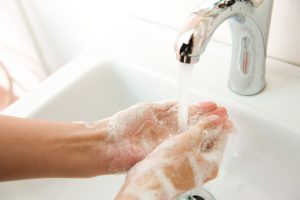October 15th marks Global Handwashing Day, a global advocacy day dedicated to, “increasing awareness and understanding about the importance of handwashing”.
The theme of this year’s Global Handwashing Day is ‘Our Hands, Our Future’, aimed at “reminding us that handwashing protects our own heath, but also allows us to build our own futures, as well as those of our communities and the world”.
Why is handwashing important?
Simply washing hands with soap could help prevent the spread of many illnesses. It can drastically reduce many of the 272 million school days that are missed due to diarrheal disease and up to 50% of the infections that are acquired in a healthcare setting.
“Handwashing with soap has the power to improve access to education for children, protect the health of patients and communities, and reduce inequities.”
It may sound simple, but washing your hands with soap is the best way to remove germs and harmful bacteria. This will prevent the spread of disease and keep your environment safe, fresh and clean.
Think you already know everything there is to know about handwashing? Take the quiz here and see how you go.
Antibacterial wash vs soap?
Alcohol based hand sanitizers are growing in popularity and are very effective at killing germs. They are a great option when soap and water are not available, but they do have their limits.
Hand sanitisers with at least 60% alcohol can kill some bacteria and viruses that make us sick. However, they are only effective if used correctly.
- Apply enough to rub your hands together and cover all areas including under the nails.
- Use a rubbing motion to evenly distribute for at least 15 seconds until hands feel dry.
Unlike the traditional soap and warm water, hand sanitizers are no help when it comes to having dirty hands. They also can’t kill all viruses, including norovirus, a very common and highly contagious illness causing stomach pain, nausea, diarrhoea and vomiting.
When to wash your hands?
- After using the toilet
- Before, during and after preparing food
- After handling rubbish
- Before eating
- Once you have used a tissue
- After working in a garden
- After handling animals
- When they are dirty
How to properly wash your hands
- Wet your hands with clean, running water.
- Apply soap and lather well for a minimum of 20 seconds.
- Pay attention to the backs of your hands, wrists, in between the fingers and under the finger nails as these areas often get missed.
- Rinse well with running water.
- Dry your hands thoroughly using a clean towel or hot air dryer.





